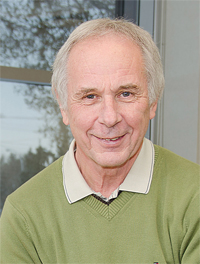Page Content
 “We teach children; we teach humans. We don’t teach a subject.”
“We teach children; we teach humans. We don’t teach a subject.”
Ted Paszek, teacher, school administrator, education consultant, trustee and association executive, has devoted his life to promoting education as the development of the whole human being—and he is still going strong.
Born in St. Paul, Alberta, Paszek began his education in a one-room schoolhouse. His family eventually relocated to Edmonton, where earned a B.A. and a B.Ed. at the U of A and began teaching at St Joseph Composite High School.
With the exception of a one-year stint as vice-principal of a school on an Armed Forces base in Quebec and a one-year sabbatical, Paszek worked for Edmonton Catholic Schools throughout his teaching career—as a teacher, department head, vice-principal, consultant and principal. He also served four years as president of Edmonton Catholic Teachers Local.
Along the way, Paszek picked up a bachelor’s degree in religious education from Newman College, in Edmonton, and a master of education from the U of A. In 2004, he retired as principal of St Vladimir School and returned to university to pursue a doctorate in educational policy studies, which he just recently received.
Paszek’s life work is “trying to animate a better vision of what it means to be a democratic citizen. … I’m not talking about merely understanding how the government works. I’m talking about understanding what the common good is and [how we can uplift] democracy . . . [to ensure that] more citizens have a sense of, and engagement and agency.”
In 1983, Paszek was elected to the board of trustees of Elk Island Catholic Separate Regional Division. With the exception of one three-year term, he has continued in that position to this day. He also served as president of the Alberta Catholic School Trustees’ Association and is currently president of the Canadian Catholic School Trustees’ Association.
Paszek is a strong supporter of public education; he believes it civilizes society. He also believes in choice in public education, which, in Alberta, encompasses the Catholic, public and francophone systems, and in Catholic education as a foundation of Canada. He points out that some people define secularity as the absence of religion. However, in Paszek’s view, “secularity means recognition of diversity. Values animate our society, and all religions—moderate religions—promote good values for citizenship . . . Public schools are awesome, but . . . the presence of a Catholic system, a values-based system . . . causes us to pay attention to the whole person.”
Paszek believes that teachers have a heightened responsibility to communicate the dynamics of democratic citizenship to their students. In his view, it is important for teachers to “nurture the spirit of democracy so that even children in Grade 1 can understand [not only] their own individual rights but also . . . the common good and their responsibility to each other.”
Rather than asking children to measure up to something, teachers need to nurture children to grow into something. He explains: “When you nurture children and develop their spirit, you create democratic citizens.”
